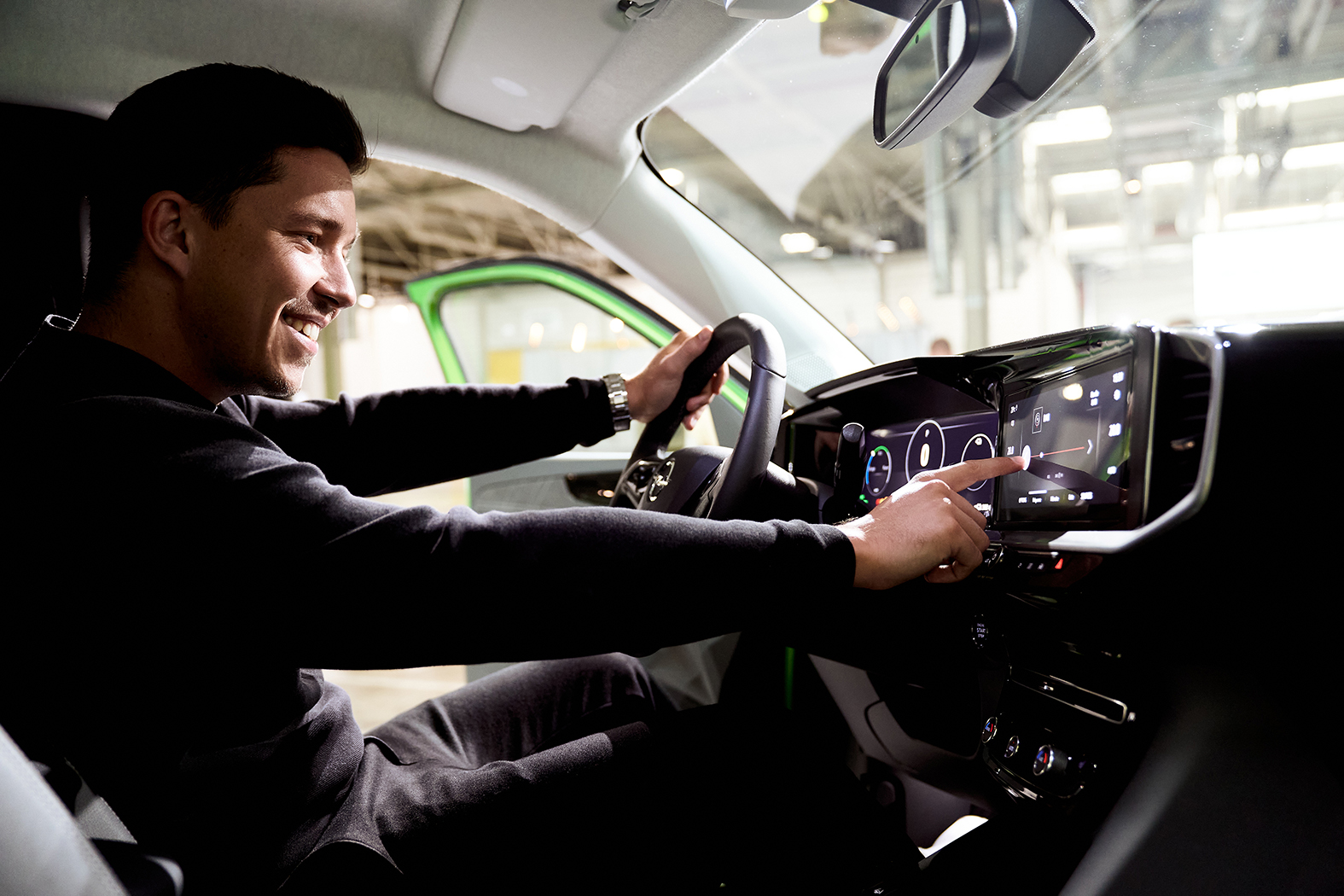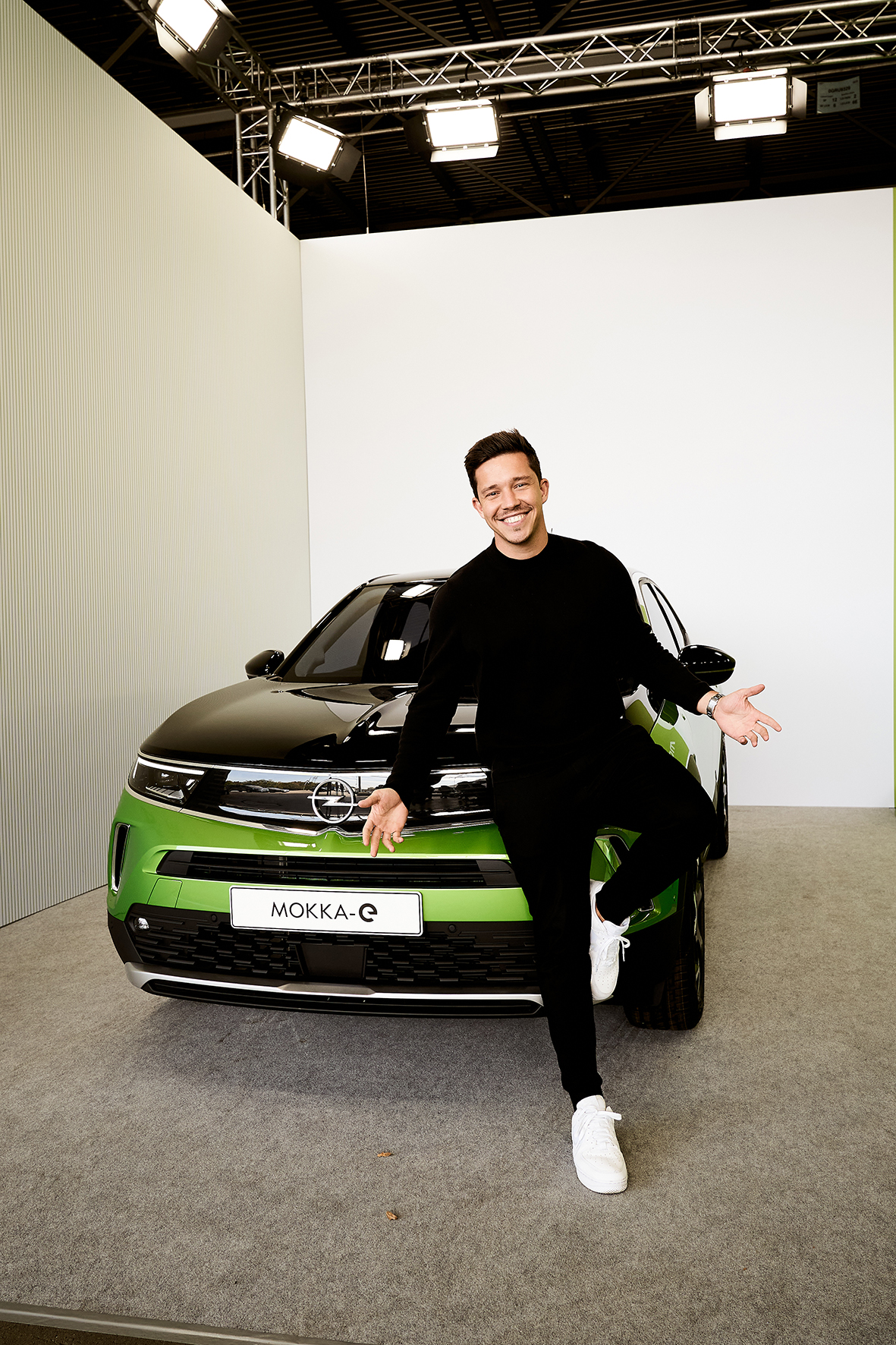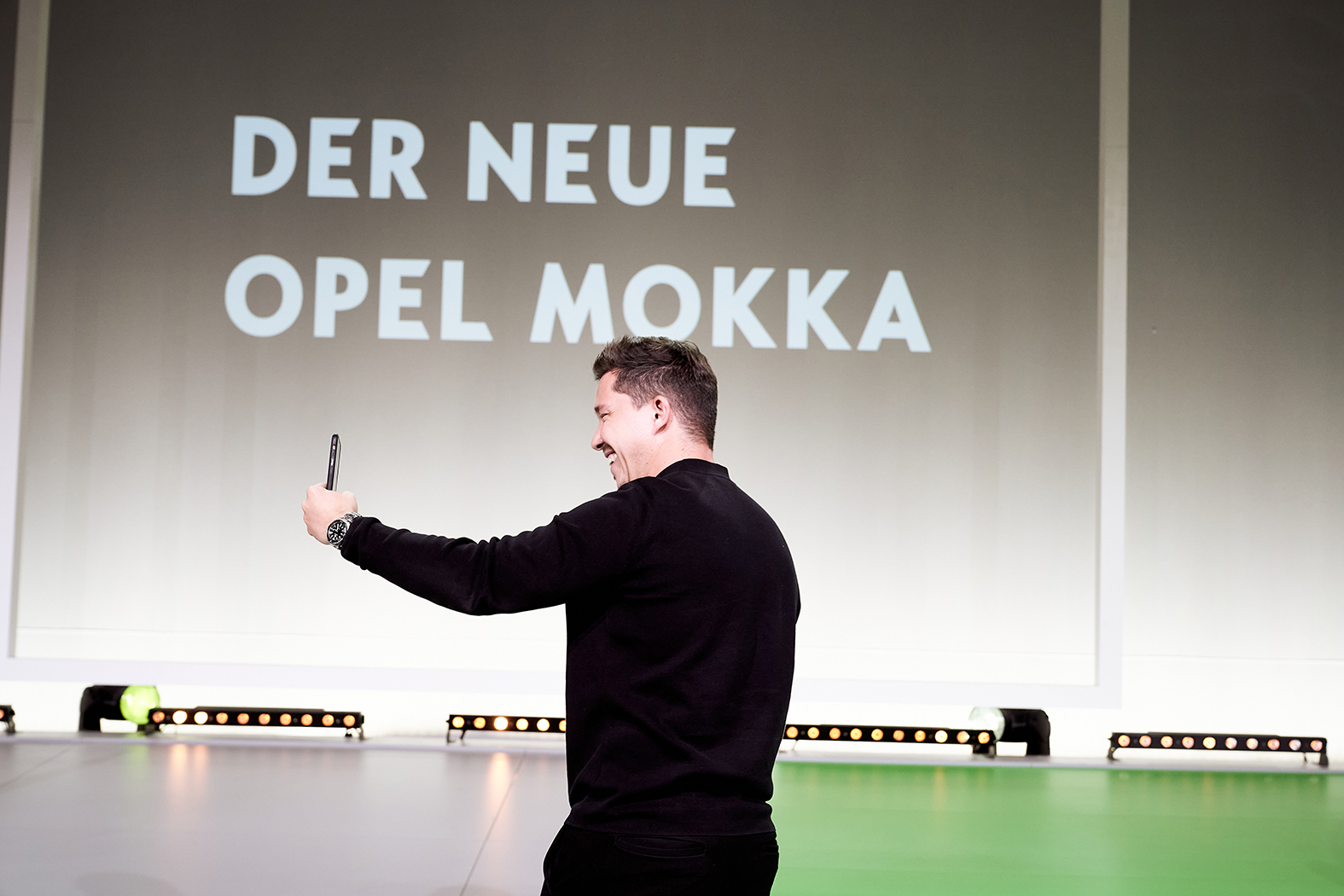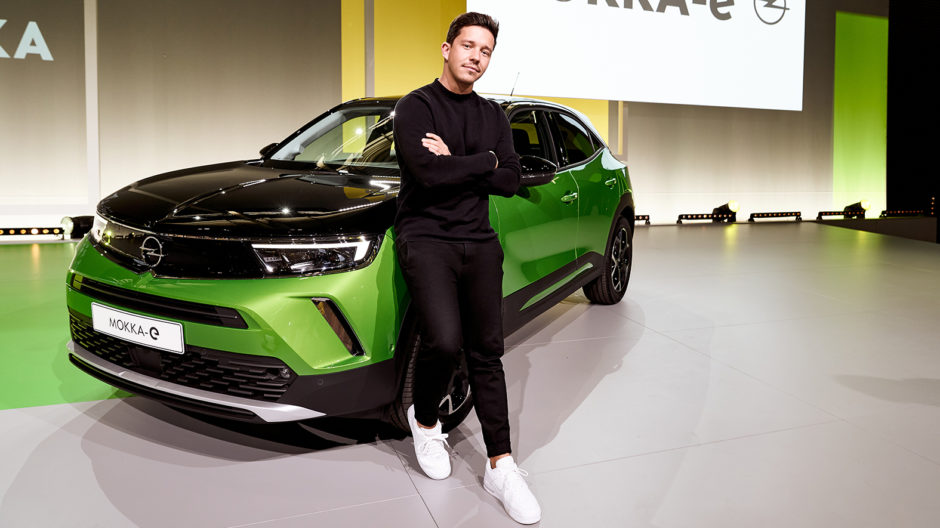Congratulations, Nico! Life’s treating you really well at the moment. You’ve brought out a new album, you’re on the jury for the casting show ‘The Voice of Germany’ and most recently you’ve even become the campaign ambassador for the new Opel Mokka. What do you like most about this car?
Well, I’ve only had my driving licence for a month and a half. I’m pleased that I can drive at long last. I’ve been waiting 27 years for this. I never wanted anything other than an SUV. But I’m also concerned about the environment, and when the enquiry from Opel came along about becoming the campaign ambassador for the new Opel Mokka, of course I was happy there was an emission-free electric version. There are two charging stations right outside my front door in Berlin. It couldn’t get any better. I’m so happy with my new Mokka!
But you’re still on probation, so to speak, as a new driver?
There’s a one-year probationary period, but I’m very confident that it’ll all work out. I’m a relaxed driver – racing around is not my thing. After all, I grew up in Mallorca, where you can only go at 110 km/h.

You dropped out of school just before your Abitur. Have you ever regretted that?
No, never. It was always clear to me that I wanted to be a musician. I knew that from the age of three. My parents are musicians and I wanted to do that, too. Of course school is important, and I would always advise my kids to do their Abitur. But my path lay in another direction. It does involve a lot of luck and lots of hard work, though.
“I’m happy there’s an emission-free version of the Opel Mokka.”
Nico Santos
Santos rose to fame with his hits ‘Rooftop’ and ‘Home’, and he has just released his second album, ‘Nico Santos’. But the singer-songwriter also produces songs for other artists, including Lena Meyer-Landrut and Helene Fischer. Born in Bremen in 1993, he grew up in Mallorca and speaks fluent Spanish. He took music and singing lessons from a young age. He was born into a musical family. His father, Egon Wellenbrink, was the iconic star of the Melitta coffee adverts on German TV in the 1990s.
You have carved out a fantastic career for yourself…
Yes, as it turned out, it wasn’t such a bad thing that I dropped out: I had no other option but to make music. That’s what drove me. I had no Plan B, so I just went full throttle with my musical plans. Nobody could have stood in my way.

What is the most important thing you’ve learnt from your parents?
To always be happy in what you do. My dad has never had a conventional job. He’s done so much: he was editor-in-chief and weather man at Radio Bremen, a background singer for Roy Black and the ‘Melitta Man’ in the coffee adverts. He never really did any training for any of that. And that’s why the most important thing is simply to be happy in what you do. My parents always taught me not to do anything that didn’t make me happy. It’s all about being happy in life.

You first tried your luck as an entertainer at the Robinson Club – that was your first job. How did this time influence you?
It made a huge impression on me. I was living in Mallorca, and had learnt Spanish and Catalan at school. I spent nearly two years at the club. That was the first time I ever met anyone from Germany. It was also the first time I had to demonstrate that I could stand up and talk in front of people. There was a show every evening: the Michael Jackson show or the Falco show. I was usually the leading man at 17, as the youngest in the team. There were a lot of 18-hour days. We started at 9 a.m. and didn’t finish till close to midnight! That’s how I learnt to work hard and communicate a lot with people. Looking back I can say it was the best school of my life!

“I’m a relaxed driver –
racing around is not my thing.”
Is it true that your parents gave you a Michael Jackson cassette at the age of three?
Yes, that’s where it all started. It kind of sparked everything off. The way I grew up was a great gift in general. There was always music on at our house. We had a studio, my mum was a drummer and my dad played all sorts of instruments. He’s a fantastic saxophonist. And we played a lot of music together. We travelled around as the ‘Welly Family’, named after the Kelly Family. So we did a little tour through Mallorca, played at village fetes… That was a wonderful time for me as a child.

When did you start trying out your own things?
I made my first radio play when I was five years old, and we did family performances together. When I was 12, I wrote and produced my first songs with Dad. That’s how my love of music developed, and it reinforced this desire I had to follow this path further.
We’ve been watching you as a juror on ‘The Voice of Germany’ since the beginning of October. What do you want to instil in the talented artists you work with on the show?
The most important thing is: honesty wins! And authenticity. Listening to other people has helped me a lot – to my team, to friends. After all, I’m still a relative newbie, and I have to say that the last five years living in Berlin have really made an impression on me. There was one special moment that I remember in particular: I was in the studio with a friend, we’d written a song, and he said to me, ‘For this one, just try a different voice – a mixture of various artists combined with your own voice. How would that sound?’ That was sort of a key moment, when I thought: okay, every song needs its own voice, its own vision. You have to imagine: who do I want to paint a picture of, how do I want to express that? How can you turn a voice into one that’s unlike any other? How do you find your own microphone voice? That’s exactly what I can best convey to my artists.
“A good tip from Sido: ‘It’s by trying things out that you also find out what you’re not so good at.’”
You write for superstars such as Helene Fischer – what can you learn from stars like that?
Helene Fischer is an exceptional artist in Germany. Superstars like her show you just how much work there is behind the scenes. Helene’s live shows alone, her albums – how carefully it’s all thought out. Those are all factors that help me. What has actually helped me most have been tips from other artists. They helped me progress. Whether it was Sarah Connor or Sido, all those tips were helpful when I started out five years ago.

What piece of advice has helped you in particular?
Sido said to me, ‘It’s by trying things out that you find out what you’re not so good at. But then you also find out what you are good at. And that’s exactly what you need to perfect!’ I thought that was great. After that, I experimented a lot and learned a lot.
Isn’t there a danger of losing your way having as much success as you have, as early as you’ve had it?
No, not for me at least. I’m grounded and I have a very good set of people around me, who look out for me. I still have the same friends as I did six or seven years ago. My family, my father, my mother and my sister Clarissa are the most relaxed people you could have in a family. They deal with it very well. I’m not worried about that at all.

Your father knows showbusiness like nobody else. What advice has he given you?
One important piece of advice from him was: don’t take everything that people say about you too much to heart. Constructive criticism is good, you can learn from that. But otherwise, don’t let all that stuff get to you too much, just keep on doing your thing. This is where it comes in handy that I’m quite forgetful. Negative comments pass me by, so to speak, because I forget them really quickly! (laughs)

You are one of the campaign ambassadors for the Opel Mokka on social media, using the hashtag #ThisIsOpel. Do you use Instagram and so on much in your private life as well?
Only to a limited extent so far. I’m only just starting properly with making and uploading videos now. So it’s still all new, but very exciting, and I’m having great fun. I still have to find my way in this virtual world.


“Honesty and authenticity win.”
You once said that one day you’d like to live on a finca in Mallorca with a wife, two children and two dogs – how are you getting along with that?
I’m inching ever closer to that dream. But I don’t want to live solely on a finca in Mallorca – I’d like a home in Germany, too. I would commute back and forth. A really nice summer in Mallorca is a great thing to experience. But not much happens on the island in winter. A lovely winter in Germany with snow also has its attractions – if we ever get any more snow…

Showbusiness is very uncertain. However, as a songwriter you have the chance to make money right into old age. Is that the second string to your bow?
Yes, becoming a professional singer was never my main motivation. I always wanted to be a musician. Part of that is writing songs, including for other people, and being creative. It was always important to me not to have just the one string to my bow – I wanted to be able to do a lot things. In the past, I’ve also written film soundtracks, such as for ‘Fack ju, Göhte’, and I’ve done some music for advertising. I’ve taken a very diversified approach. In today’s world, it’s not enough to just be a singer any more.
You dedicated the song ‘Walking in your shoes’ to your best friend, who died in an accident. Is it true that he’s a kind of guardian angel to you?
Yes. I’m not the most religious person, but when I pray, I pray to him – asking him to help make sure we’re all okay – his family, our family, our mutual friends from the old days. I’m absolutely sure that my friend is watching over me from up there.

What makes you happy?
When my family and friends are healthy; that we all stick together – that makes me happy.

What is your greatest wish?
That the coronavirus crisis will be over soon and we’ll be able to play concerts again. My tour has been put off until spring 2021. I really, really want things to get going again soon – for my crew and for the fans!
Nico, thank you for taking the time to talk to us.

November 2020
